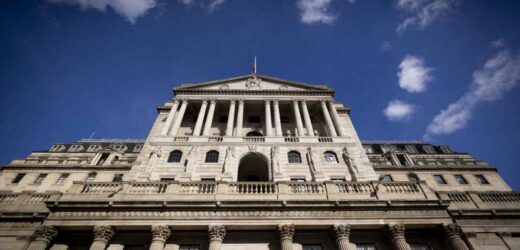MARKETS are facing more chaos again today after the value of the pound tumbled.
It follows the Bank of England's announcement that an emergency bailout of pension funds will not continue beyond Friday.
The Bank of England boss Andrew Bailey told pension funds: "You've got three days left now and you've got to sort it out."
The pound plunged against the dollar, dropping below $1.10 for the first time in weeks, dropping from 1.1178 to 1.0953 overnight.
It is now sitting at around $1.10 at the time of writing.
The Bank of England was forced to step in for the third time in a week yesterday to try to calm the markets and prevent a “fire sale” of Government debt.
It said the ongoing instability in the bonds market poses a "material risk to UK financial instability", and revealed an emergency plan to calm markets.
It beefed up its earlier intervention by buying up to £5billion of index-linked bonds, alongside £5billion of conventional bonds per day, starting Tuesday, October 11, until October 14.
In total, it means the BoE will be purchasing up to £10billion of bonds every day – but support beyond Friday won't continue.
The government bond market is worth £2.1trillion, and underpins the UK financial market.
The intervention by the Bank was its second in two days.
Experts said instability, caused by traders selling off Government debt, was hitting pension funds.
The funds have fallen in value by around 12 per cent in the past year, according to Nathan Long, senior analyst at Hargreaves Lansdown.
Index-linked government bonds are meant to be very stable – but one bond that was issued last September has fallen by 80% in a year in value.
Mr Bailey said pension funds had just days left to sort out the mess.
Speaking at an event organised by the Institute of International Finance in Washington, he said: "We have announced that we will be out by the end of this week. We think the re-balancing must be done.
"And my message to the funds involved and all the firms involved managing those funds: You've got three days left now. You've got to get this done."
Amid the alarm, mortgage rates for a fixed two year deal hit 6.43 per cent — up from 2.25 per cent last year.
Markets have been spooked about the rising amount of government debt following the mini-Budget, triggering the sale of bonds.
It put several large pension funds at risk of collapse, which would have had a catastrophic effect on Brits' private pension pots and likely would have resulted in a downward spiral of the market.
The pensions industry body, the Pensions and Lifetime Savings Association, has warned against the BoE ending it's emergency pension fund bailout "too soon".
It suggested the support should be extended until October 31 when chancellor Kwasi Kwarteng is due to release details of his economic plan
The plan will explain how government spending – including tax cuts – revealed in the Budget will be paid for.
It comes as the economy unexpectedly shrunk by 0.3% between July and August.
Experts had been expecting the UK's economic growth to flatline in August.
The Bank of England has warned the UK will go into recession towards the end of the year.
A country is in recession if it experiences a period of economic decline over a sustained period – usually if GDP contracts for two successive quarters.
Recessions are worrying because they tend to lead to unemployment and wage stagnation.
This consequently means the government gets less tax, which could mean cuts to services and benefits, or that rates go up.
What are bonds?
Bonds are IOU notes that the government uses to borrow money and pay a fixed amount in interest.
Government bonds are called GILTS and are bought and sold by investors, including pension funds, who like them because they are usually fairly stable, long term investments and help cushion them from interest rate volatility.
Gilts tend to go down in price when interest rates are rising, and increase when rates are falling.
People pay attention to the YIELDS – the amount of interest on the bonds which is described in % terms – because this shows investors’ confidence in them.
The higher the yield, the cheaper the price, and the riskier investors think they are.
Bonds are in the spotlight at the moment because yields on gilts are trading at the same highs as in the scary days of the last financial crisis in 2008, suggesting investors are nervous about the UK economy.
The yield on a 30 year gilt is 4.5% – the highest level in 14 years.
The Bank of England is stepping in to buy more of them in order to prevent the collapse of the government bond market.
The BoE said: "These additional operations will act as a further backstop to restore orderly market conditions by temporarily absorbing selling of index-linked gilts in excess of market intermediation capacity."
What it means for your money
Anyone with a private pension is not directly affected by the Bank of England’s bond buying.
But it has stepped in to ensure that the way pension cash is collectively invested remains stable – and isn’t affected by dramatic movements in the markets after the pound plunged.
Workers who save into a private pension should continue to save into them as normal.
As pension savings are a long term investment there is time to ride out any market falls, as they bounce back in time – for example, from the global financial crisis and the Covid pandemic.
Funds invested in the UK stock market will have fallen in value. But when sterling is weak, the value of overseas investments when converted back into sterling will receive a boost.
So it depends how your pension is invested, and is why it pays to diversify your investments.
Some types of pension – known as defined benefit (DB) or final salary – are more invested in gilts (government bonds), and so are more exposed to falling gilt prices.
The Bank of England’s (BoE) bond buying is aimed at stopping them falling too far.
Helen Morrissey, pensions expert at Hargreaves Lansdown previously told The Sun: “The BoE’s announcement should calm the markets after a tumultuous few days that have caused chaos with news of some final salary schemes having to sell assets at short notice.
“This should settle down but final salary scheme trustees have been urged to keep the resilience of their investment strategies under close review.”
Most read in Money
B&M shoppers are rushing for 'stunning' Christmas items they 'need' to buy
Exact date benefits-uplift decision will be revealed
Urgent warning for thousands over surprise tax bills – see if you're affected
Amazon Prime Day best deals revealed including air fryers and kids toys
Source: Read Full Article









